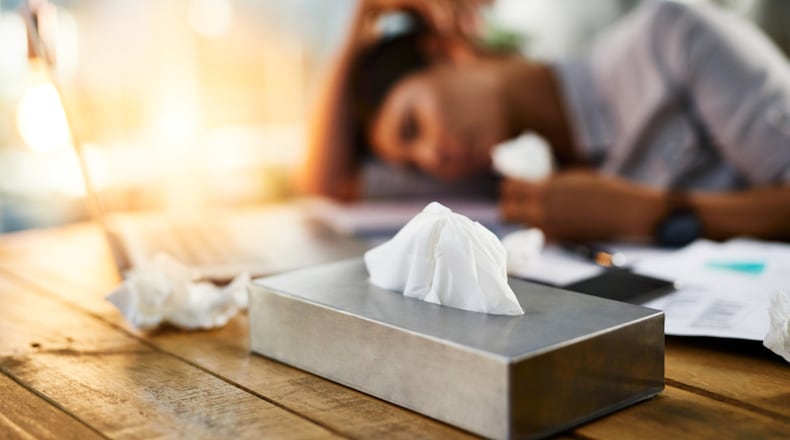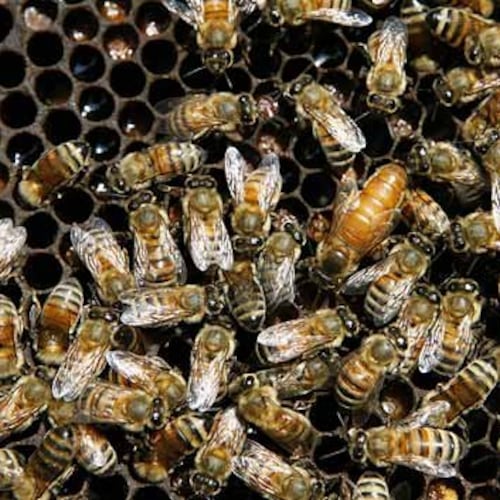Affectionately known as a “city in the forest,” Atlanta’s lush green canopy also makes this metropolis notorious for high pollen counts — especially in the spring when tree pollen peaks.
This weekend, Atlanta recorded its two highest pollen counts in 35 years, according to Atlanta Allergy & Asthma. Saturday’s pollen count is almost double the highest count recorded last year at 8,740 on April 2, 2024.
Severe seasonal allergies can interfere with daily activities. Symptoms can include severe headaches and brain fog, preventing people from enjoying spring-like temperatures outdoors and even sabotaging their sleep. And because there are other viruses circulating this time of year, it can be difficult to tell the difference. According to the Mayo Clinic, allergies never cause a fever and only rarely cause a sore throat. Many other symptoms — a stuffy or runny nose, sneezing and tiredness — may be similar to a cold.
Credit: cust
Credit: cust
The Atlanta Journal-Constitution previously spoke with Dr. Lily Hwang of Atlanta Allergy & Asthma. She offered steps and strategies to help reduce your allergy symptoms.
What triggers springtime allergies?
If you experience allergic symptoms in the springtime, you are likely reacting to pollen from trees.
Contrary to popular belief, flowering trees such as cherry trees are usually not the problem. The pollen from flowering trees tends to be bigger and stickier and less likely to travel in the wind. The bright yellow pollen you see coating cars and sidewalks and cars is also not to blame for making people sneeze.
It’s the hardwood trees, including oak, hickory and birch trees, red cedar. They have light, powdery and often invisible pollen causing the most havoc. These hardwoods produce lightweight pollen which can be carried by the wind, sometimes over vast distances.
How can we reduce our exposure to pollen?
Hwang recommends regularly checking daily pollen counts. Severe allergy sufferers should try to stay indoors on the windiest, driest days, because the pollen is usually higher than after a good rain, which helps clear pollen from the air. High pollen days, she said, are not the time to go for a run or do yardwork chores such as lawn mowing, weed pulling, and gardening — all of which can aggravate your pollen allergy.
If you’ve been outside a lot during the day, pollen is on your body and clothes. Upon arriving home, immediately take a shower and change clothes.
Whenever pollen counts are high, make sure to keep your doors and windows closed. You can keep your indoor air clean by using high-efficiency air filters on air conditioners, using a dehumidifier, putting an air purifier called a high-efficiency particulate air (HEPA) filter near your bed, and cleaning your floors often.
Credit: JOHN SPINK / AJC
Credit: JOHN SPINK / AJC
Take extra steps for your dogs and cats
Hwang says a quick wipe down of your pet’s coat, skin and paws each time they return from outdoors will help remove excess pollen and allergens when a full bath isn’t possible.
If your pets sleep on the bed, consider a separate blanket or sheet for them to sleep on.
Over-the-counter medications can help, but start early
Hwang said it’s best to start taking medication a couple weeks before your allergy symptoms typically arrive. But the medications can also be taken as needed during the season. You’ll just have to be patient (and likely suffer a little longer) before they fully kick in.
Nasal steroid sprays are often the best first treatment option. They block inflammation and swelling caused by airborne irritants and allergens, and prevent allergy symptoms. Over-the-counter steroid nasal sprays include: Triamcinolone (sold under the brand name Nasacort); fluticasone (Flonase or Flonase Sensimist); and budesonide (Rhinocort).
These medications usually start working after a few days. They can take a few weeks to reach peak effect and work best when used consistently, at least during your allergy season.
Many oral antihistamines available without a prescription can also be a remedy. Examples of oral antihistamines include cetirizine (Zyrtec Allergy), fexofenadine (Allegra Allergy) and loratadine (Claritin, Alavert).
Over-the-counter antihistamine eye drops can also be helpful. Hwang said don’t use decongestant eye drops designed to reduce the redness in the whites of your eyes, which can intensify the symptoms in the eyes.
When is it time to see an allergist or ear, nose and throat specialist?
If a couple of weeks or more go by, you’ve tried drugstore medications and symptoms don’t improve, it may be time to see a doctor.
An allergist can tell you what you are allergic to and help you avoid triggers. They can prescribe medications and help put together a plan to help prevent allergic reactions. This can include immunotherapy, which involves giving gradually increasing doses of the substance that triggers an allergic reaction. This treatment method allows the immune system to become desensitized to the allergen.
Also see a doctor if you are wheezing, have persistent coughing or discolored sinus discharge lasting more than a week, which could be a sign of a sinus infection.
How long will the pollen season last?
The spring pollen season can last until May, with the highest pollen counts usually between mid-March and mid-April.
But in the Southeast, there are multiple pollen seasons with different pollen types dominating. After the tree pollen season ends, grass pollen typically arrives in the late spring and early summer, followed by weed pollen in late summer to fall.
About the Author
Keep Reading
The Latest
Featured






